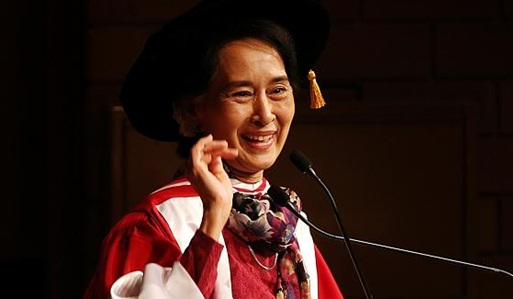those certain females: democracy and the rule of law – aung san suu kyi in melbourne

In a moving ceremony on Saturday 30 November, Aung San Suu Kyi was awarded an honorary Doctor of Laws from Monash University. The award serves as recognition of the impact she has made in the global struggle for human rights and democracy.
Aung San Suu Kyi is one of the most impressive and significant political figures of our time. Her grace, fortitude, resilience and courage are inspirational – both as indicators of political conviction and symbols of the power of individual will. She possesses an ironclad resolve and an astounding political intellect, but also a deep sense of calm and warmth.
Suu Kyi was born in Burma, and studied politics, economics and literature in India, and at Oxford and the University of London. She worked at the United Nations in New York before returning to Burma in 1988 for personal reasons. She was moved to public action by the violent repression of the military junta. Her subsequent political career and campaigning has been based not on a personal desire for power, but on a longing for Burma to instigate a fully democratic political system.
With her party, the National League for Democracy, Suu Kyi has worked tirelessly over the course of two decades, campaigning against the multiple violently repressive military juntas. She was awarded the Nobel Peace Prize in 1991, but did not accept it in person because she had rejected the ruling regime’s offer to leave Burma and never return. After over a decade of house arrest, silencing, and violent attacks, Suu Kyi was elected to parliament in April 2012 in response to international condemnation of the current government. She became the Leader of the Opposition and has announced her intention to run for the Presidency in the 2015 elections.
Suu Kyi’s honorary doctorate was awarded at Monash University before a sold out crowd of over 1500. During her address, she spoke plainly and passionately on the topic of reconciliation and the rule of law. She was both discursive and specific, drawing on Burma’s history and her personal experience, and applying these to ideals about justice and the role of education in establishing democratic society.
SuuKyi acknowledged the difficulties inherent in the task of uniting over one hundred ethnic nationalities that lack understanding of one another. She pointed to the issues of different races and ideological beliefs as central causes of Burma’s ongoing insurgencies. The inability to settle differences peacefully is the basis of the country’s strife. However, she was still characteristically optimistic: ‘I’m not now going to speak about the past, but about the future,’ she said.
Her talk was charged throughout with her firm belief in the need for a fair and disciplined rule of law. This has been hampered by the experience of the majority of Burma’s population, who have only ever known the law as a set of restrictions and oppressions intended to stop them realising their potential. ‘We are just starting out on the road to democracy,’ Suu Kyi said. ‘We can never come to the end of the road. It must be an ongoing process – like the process of reconciliation.’ She described her desire for the Burmese people to experience rule of law, rather than rule by law, and in doing so ‘break out of the prison of the past’.
Suu Kyi’s abiding passion for the gifts and opportunities offered by democratic society was evident. She was not utopian or unrealistic, and stressed that every person must contribute to democracy in order for it to succeed. ‘Democracy is not just rights; it is responsibilities.’
She closed by praising Australia’s political freedoms, and our unique perspective and potential as a Western-influenced, Eastern-located nation. She suggested we ought to think of countries like Burma, and work with them. In response to an audience member asking where she drew her strength at the most difficult times in her life, she said simply, ‘I have a very fertile imagination, but I never despaired.’ It was a response which typified the honest, forthright and generous outlook of this extraordinary and tireless woman, who has dedicated her life to fighting for democracy and human rights.
Veronica Sullivan is a writer, bookseller and masters student from Melbourne. She blogs here and tweets here.

